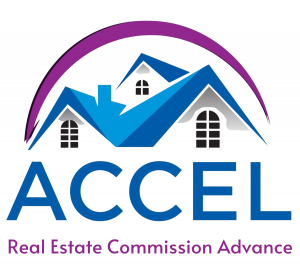Realtors Need Access to Quick Financing – Like Real Estate Commission Advances

Realtors need financing – realtor commission advances help. Being a real estate agent is a business, and like any business, you are going to need access to financing if you want to be successful and grow your business. A lot of articles about how to get startup capital for real estate agents make suggestions like using your 401k, and personal credit cards, borrowing money from your family, or taking out a second mortgage. But you don’t see real businesses doing that. That isn’t how they finance their operations, so why would you?
Real businesses use factoring their accounts receivable to get their money, take out loans, or lines of credit, or seek out private equity investors (and more). In this article we are going to discuss financing options for real estate agents, which include taking out advances on your commission, which is called “factoring” in financial terms, and has been used by businesses to finance their cash flows since conducting business has been around.
What Commission Advances Are and Why They Can Be Helpful For Realtors
Realtor commission advances give you the ability to receive your money in advance of closing which can take weeks or even months. Obtaining a commission advance will let you quickly access the funds whenever you need them.
Commission advances are a type of loan that allows Realtors to access their commission payments before the sale has closed. This can be helpful for Realtors who have a busy workload and need quick cash flow in order to pay their bills or invest in new real estate opportunities. With commission advances, Realtors can get the cash they need without having to wait for commissions from sales that haven’t yet closed.
Reliable commission payments are crucial for realtors. Commission advances provide a steady stream of income that they can count on, rather than having to wait for sporadic commission payments from multiple sales. This financial stability gives Realtors the ability to better plan for their future.
In other words, commission advances are a dependable method for realtors to receive their commission payments before they are actually due. With these types of advances, Realtors can get the cash flow required when necessary, support new investments and rapidly expand their business–all while experiencing more consistent commission payouts. Consequently, Commission Advances can be priceless for those Realtors aiming to improve their business prospects.
The Benefits of Commission Advances for Realtors
Commission advances provide Realtors with the ability to have a steady stream of commission income, rather than waiting for sporadic commission payouts from multiple sales. This is beneficial because it offers realtors the flexibility to access commission payments right away so they can reinvest that money, pay bills, or take on more deals. Additionally, commission advances can help Realtors maintain financial stability because it gives they quick access to capital whenever they need it.
The Best Real Estate Commission Advance Companies
Real estate commission advance companies are private equity investment businesses that specialize in the real estate industry. The real estate agent gets the benefit of having quick and easy access to their capital whenever they need it, and the Real Estate Commission Advance Company gets paid in fees for making real estate commission loans. Real estate commission advance companies charge fees based on the amount of the advance and receive their money directly from the closing agent at closing.
Real estate commission advance companies provide a valuable service that can make all the difference when it comes to helping realtors get easy access to capital. These companies understand the unique financial challenges faced by real estate agents and offer flexible solutions that allow realtors to access the funds they have already earned quickly and easily. With the help of a reputable commission advance company, realtors can successfully manage their cash flow and continue to grow their business with confidence.

It shouldn’t be a surprise to discover private equity funders are getting involved in financing real estate agents. Real estate is big business. Private equity firms of all kinds are looking for new and innovative ways to lend money and provide private equity investments directly instead of being part of Initial Public Offerings, or buying stocks and bonds. They are tired of paying layers of “middlemen” too and are seeking out direct access to industries like real estate agents to offer funding and make direct investments.
The best real estate commission advance companies are direct funding companies. Direct funding means that the company that is offering you an advance on real estate commission is not a broker or a “middleman.” They are the company that is making the advance, not a third party who is just marking up your commission advance while someone else is actually loaning the money. If you are checking into real estate commission advance companies, ask them if they are a direct lender or if they are a broker just tacking on fees as a middleman.
Why Realtors Use Commission Advances
Real estate agents are typically independent contractors, meaning they are responsible for all aspects of their business, including business finance. Unfortunately, realtors often face a unique set of financial challenges and pressures when it comes to earning and managing their commission income. Real estate agents only get paid after the successful sale or rental of a property. This means that realtors are often left waiting for payments, and trying to pay their bills, marketing, staff, and grow their companies but are stuck waiting on their money.
This is where commission advances come into play. Commission advance companies provide real estate agents with a way to receive immediate access to their earned commission, without having to wait for the sale or rental of a property. This allows real estate agents to cover their immediate expenses and keep their finances stable while they continue to grow their business. By providing realtors with quick access to funds, they can help finance slow periods (or growth periods).
How Does a Real Estate Commission Advance Work
The commission a realtor is owed at closing from the sale of a house is considered an asset – just like a stock or bond is considered an asset. Just like a stock or bond, your real estate commissions that are pending can be sold to another person at an agreed upon price.
When you take a real estate commission advance, what you are really doing is selling a portion of your pending commission to a third party (a real estate commission advance company in this case) at a discounted rate. The third-party finance company then collects what is owed to them at some point later (like during closing from the attorney or closing agent) for its full (mature) value.
Example of Selling an Asset to a Third Party at a Discounted Rate Infographic*

$500,000 – Amount of Money You Are Guaranteed to Receive in Two Months
$450,000 – Amount You Agree to Sell Your $500,000 for and Receive immediately
$500,000 – Amount the Third-Party Buyer Receives in Sixty Days
$50,000 – Amount of Profit The Third Party Made on This Transaction
*This infographic does not depict an example of a real estate commission advance transaction, actual or fictitious, and is intended ONLY to explain how selling financial assets might work. It is intended for educational purposes only and should not be interpreted in any way to reflect an actual real estate commission advance transaction. Fees for Real Estate Commission Advances change frequently-plus, you cannot receive a 100% advance on commissions owed to you.
Being A Realtor is Expensive
Real estate agents have a lot of expenses. They have to pay rent, utilities, franchise fees, licensing, marketing costs, professional development fees, transportation costs, staging company fees, and more. Depending on the size of their firm, they may also have to pay for staff, office space and equipment.
In addition to these recurrent costs, savvy realtors will be investing in the growth of their businesses which often tie up a lot of money.
A realtor’s typical expenses can be broken down into three main categories: recurring costs, overhead expenses, and business investments.
Recurring Costs: Recurring real estate agent expenses include advertising costs for print media and digital campaigns, membership dues for local associations and multiple listing services (MLS), subscription fees for lead services, continuing education, and seminars.
Overhead Expenses: Once a realtor has established their business, they may incur overhead expenses such as employee salaries, office rent and utilities, equipment purchases or leasing costs, insurance premiums, accounting, and legal fees for compliance or contract preparation.

Business Investments: To ensure the success of their business in the long term, realtors should also consider investments in their personal businesses such as website design and development or software subscriptions. This could include payment gateways for online transactions, CRM software to manage contacts and leads more effectively, or digital marketing tools to optimize campaigns.
You get the idea – being a successful realtor is going to have a lot of expenditures associated with growth and operations. Often, these expenses must be paid up front, every week, every other week, or monthly. But that isn’t how realtors get paid – they make money at highly irregular intervals, especially compared to how their bills get paid (constantly). This imbalance between money going out versus money coming in creates cash flow problems for realtors that few other businesses endure. Therefore, having access to capital from third parties is important – because it is hard to finance a business with your own cash.
Cash Flow Struggles for Real Estate Agents
Lots of businesses struggle with cash flow. The money is often going out faster than it comes in. It isn’t unusual for any business to need access to capital because of cash flow struggles, and realtors are no exception.
Understanding the Cash Flow Conundrum
Cash flow is the term used to describe the “flowing of cash” into your bank account versus the “flowing of cash” out of your bank account. That is all “cash flow” means “money flowing in and money flowing out.”

When your money is flowing out faster than it flows in, or you have to lay out a bunch of money and then wait until later to get paid, you will need to be able to borrow money from somewhere to keep your business running while you wait for your money.
If you have money going out fast, and coming in slow, and this situation persists, eventually you run out of money to pay your bills or pay your employees. When that happens, you go out of business.
It doesn’t matter if you’ve got a lot of money coming to you in the future – you can’t pay bills with what is coming down the road. Creditors aren’t interested in the money that is coming to you someday – they want their payments now.
Remember this – when you are out of money to pay people, you are out of the game. It doesn’t matter how much money you have coming to you in a few months or even a few weeks. When you can no longer pay your bills or people, you go out of business. Your creditors will sue you to get at that money you are owed in the future, but you will be out of business in the meantime.
Also – remember, it doesn’t matter where you get the money to pay your bills. You can pay bills with credit cards, lines of credit, bank loans, commission advances, and more. As long as you can pay your bills and people, you stay in the game. They don’t care where the money came from as long as they keep getting paid.
What is Cash Flow Management?
The purpose of cash flow management is to keep the money coming in faster than it goes out. Cash flow management is any method or means by which you regulate the two flows of cash (cash flowing in and cash flowing out).
There are three basic cash flow management activities:
- Try to slow down the speed (and amount) of the money going out
- Try to Increase the speed (and amount) of the money coming in
- Borrow funds to finance the time gap between money going out and coming in
It’s Hard to “Cut” Your Way to Success
When it comes to cash flow management, most people are only aware of one strategy, which is to reduce the amount of money they spend or try to slow it down. But the reality is, most successful businesses don’t focus a lot of their attention on cost cutting.
They typically direct their attention to bringing in a larger volume of cash and getting that cash as fast as they can. They typically do this by increasing prices, driving up sales, and invoicing their customers quickly.

Most larger organizations don’t focus on either of the first two methods of cash flow management. They get the money to fund their operations through financing it. They may do this by taking out loans, selling bonds or stock (equity), factoring payments they’re owed (selling the debt at a discount), or seeking out private equity investment. This is how successful companies manage their cash flow – with “other people’s money.” Remember, it doesn’t matter if it is your money or someone else’s – if you can pay your bills, you stay in business.
But however you do it, the goal of cash flow management is to take action to make sure you don’t run out of cash to pay bills, fund operations, and keep your real estate business growing. Very few people are going to “cut” their way to success. You need money coming in frequently, whether that is from sales, or from taking out loans. Either way, you must have enough cash available to you to pay people, or you are out of business.
What Are Cash Flow Problems?
Having cash flow problems means you don’t have enough capital to pay your bills, pay your vendors, pay your people, and grow your company.
What Causes Cash Flow Problems for Realtors?
Timing is what creates most cash flow problems for realtors. The “timing” of when they get paid (money flowing into their bank account) versus the timing of when that money gets spent (money flowing out of the bank account) are greatly misaligned.
How does that work?

It works like this: You spend a lot of money up front to secure listings, stage the house, and host open houses – But during that time, you are not getting paid, so your savings is going down steadily (or your credit card balance is going up). Then you have to close the sale, and then you still have to wait for closing to get paid. Most businesses struggle with cash flow unless they get paid up front for their work. What makes real estate agents different is that instead of waiting thirty days to get paid for their work, they can wait a year or longer to get paid.
The Solution to Cash Flow Problems for Realtors
The solution to cash flow problems for realtors is to have access to capital so you can “finance the gap” between spending your money and getting paid when a deal closes.
Real Estate Commission Advance Versus Bank Loans
In contrast to a bank loan, a real estate commission advance doesn’t require a great credit score. Also, the fee structure for a commission advance is entirely different than that of a normal bank loan. A real estate commission advance doesn’t accrue daily, monthly, or yearly interest like other loans do, nor are there monthly payments to make.
A real estate commission advance is more like selling futures than it is a loan. You are agreeing to sell an asset to a third party at some date in the future, and they will pay you an agreed-upon amount of money for the discounted rate today. This method bears no resemblance to how banks function.
Credit is Not a Primary Factor When Underwriting a Commission Advance for Realtors

You don’t have to have a great credit score to get a real estate commission advance. Because the real estate commission advance company gets paid directly from the closing agent, there is little risk to the company of a default.
Real Estate Commission Advance companies prioritize checking for liens and judgments against the realtor before they enter into an agreement. This is to ensure a guarantee of collecting their money at closing, without the worry of other lien holders who have priority claims over the commissions.
Access to Capital is Important for Realtors
Most businesses use loans, lines of credit, and the sale of bonds to finance growth or day-to-day operations. Businesses, both small and large, use multiple financing sources to ensure they always have cash available to them to pay bills, pay employees, and make major purchases.
Access to capital can include private equity, futures trading, lines of credit, and factoring. You’ve probably heard the saying “don’t put all your eggs in one basket.” The same goes for business finance. Relying on only one source could cause your business to fail if that option is suddenly shut down or unavailable. Multiple financing options are always best when it comes to business finance.
Advances On Real Estate Commissions Are Fast and Flexible

Speed, agility, and flexibility are important factors to think about when you choose your business finance options. For example, if you need a lot of money quickly to take advantage of a real estate deal but you rely entirely on traditional loans, the loan process may be too slow, and you miss a good deal because of it.
Banks are some of the most powerful financial institutions in the world, but they are not known for their speed or agility. They are careful. They follow their landing standards in almost every case when it comes to deciding whether to underwrite a loan or pass it up. Their processes help ensure they don’t make many “bad loans.”
All the checking and double-checking banks have in their underwriting process take time, but you don’t always have time, do you? Opportunity waits for nobody as the saying goes. Great deals don’t last long. If you can’t come up with the money to do the deal, someone else will. Real estate agents need access to “quick capital” – otherwise, they will miss out on a log of opportunities.
You can get a real estate commission advance quickly – sometimes in less than forty-eight hours. This is one advantage advances on real estate commission have over traditional types of lending.
Real Estate Commission Advances Do Not Require Additional Collateral
A real estate commission doesn’t require capital assets as collateral – the commission due at closing is the collateral. Traditional bank loans and lines of credit will typically require collateral to back the loan. But with a real estate commission advance, you don’t have to tie up your collateral to get some of your commission up front.
Also, when you use an asset as collateral for a loan, a Lien is filed against it- meaning that if you default on the loan, someone else has the first claim to the asset. Because of this, you often can’t use one piece of collateral for two different loans. This means that to keep taking out loans that require collateral, you have to keep coming up with new collateral, which can be a challenge. How much collateral do you have?
Self-Financing Your Real Estate Business Growth is Bad Business
Most non-savvy realtors try to finance their business using personal savings, and credit cards, taking out a second mortgage, borrowing from friends or family, and selling off valuable items. And if you read many blogs about how to get financing for your real estate business, these are the types of funding activities you will find people suggesting.

But funding your business growth based entirely on your own cash flow is not a good idea. Big businesses never try to finance their expansion with their own money. They take out loans, use factoring, sell stocks, sell bonds, and take out private equity investments.
Business owners who think small tend to stay small. If you really want to grow your business, at some point you are going to need access to more capital than you have in your savings account or on your personal credit cards.
Realtors Need to Keep Their Money Flipping
To be successful, it is important to keep your money “on the move” or “keep it flipping” as some people say. Time spent sitting around waiting to get paid, just gets “added” to the time it will take you to succeed. Get your money as quickly as you can and put it back to work.
In an interview about spending money for your future success, Gary Vee (Vaynerchuk) said something like this:

“Every month I saw the bill come in from Google and it was like, eighty thousand dollars per month. And I thought to myself I should try to keep that expense down. I was wrong. So wrong. I should have been figuring out how to spend three million dollars per month. And If I had done that, my company could have been where it is now, three years ago. But I only looked at the expense, not the goal of my marketing.”
People say you need to spend money to make money. What they don’t say is the amount of money you have to spend is often limited if you are relying on your own savings account to finance your growth. The amount of money you can spend is going to have a massive impact on the money you end up making.
But you can’t spend it if you don’t have it. Sitting around waiting months for a closing to get your hands on your money is just lost time. Get your money as fast as you can and get it working for you.
Incorrect Thinking About Real Estate Commission Advances
Some people believe that if you save well and manage your money well that you shouldn’t need an advance on your commission. These are the same people who think that being debt free as a business is really doing well. They are wrong. Totally wrong – and you shouldn’t listen to people who think this way.
Big businesses never hesitate to use “other people’s money” to grow while they keep their cash in their checking account.

As a matter of fact, if you come across a business that has no debt and only utilizes cash for financing growth and operations they are “asleep at the wheel.”
How do you know they are asleep at the wheel? Because if a business is hiring top talent, purchasing new technology to gain a competitive advantage, marketing aggressively, and moving into new markets, they wouldn’t be able to afford all of it through their own cash flow.
Always be wary of taking advice from those you deem experts in your field. Just because they dress and speak the part, does not mean they really know what they are talking about. In fact, some of their untested thinking might hold you back professionally. Do not feel ashamed to take out loans or use others’ money to finance your growth–that is what almost all big businesses do. If they did not, they would quickly get left behind by rival companies.
In fact, this is one of the reasons that real estate commission advance companies came into existence. Investors are looking for growth opportunities for themselves outside of traditional investments like stocks and bonds. They see offering realtors an advance on their commissions for a fee as being sound investing. They know savvy realtors want to grow businesses and need access to capital. Investors
What Does a Real Estate Commission Advance Application Look Like?
The application takes about 10 minutes to complete and can be filled out online. It asks for the amount of advance you are looking for, information related to the property on which you are requesting an advance, and the approximate closing date. Information related to the lender and lending officer is also usually requested.

In the application, you will be asked to provide:
- Proper identification, such as your driver’s license
- MLS listing of the property showing the status as “under contract”, “pending”, or “sold”
- Wire instructions (where to send your advance)
- Closing date
- Whether you are representing the buyer or seller.
- Evidence that contingencies have been satisfied.
- Commission sharing agreement or documentation showing net fees owed to you.
Applying with Accel Commission Advance
Once Accel receives your application, their proprietary cloud-based processing system allows them to advance your commission quickly and efficiently, in as little as 24 hours.
What do the underwriters look for on an application?

To confirm that the agent or broker requesting the advance is actively representing buyers or sellers in real estate transactions, underwriters look at data related to the number of transactions that the agent or broker has completed in the last six months and how many active and pending listings they currently have.
Accel Commission Advance requires that an agent or broker has at least one other listing or active deal in the process of closing. The deal must also be scheduled to will close within 45 days. The credit score is not considered in their underwriting process.
How are the fees determined?
Fees are set based on numerous factors, and each case is assessed individually. Accel offers reduced fees as an agent or broker completes more advances with them and establishes a consistent track record. Accel offers competitive fees as low as 8 percent.
How Do I Get My Money from a Real Estate Commission Advance?
Advances will be delivered to your bank account via a wire transfer. Accel gets you paid fast. Overnight funding for realtors is possible, especially for agents and brokers that have already done business with Accel.
How do I Pay Back a Real Estate Commission Advance?
Repayment of the advance happens automatically when your sale closes. The settlement company will receive a commission disbursement authorization signed by your broker instructing them to send a portion of your commission directly to Accel on your closing date. So there is nothing for you to do. We collect our money directly at closing.
About Accel Real Estate Commission Advance:
We are a direct funder, not a broker like most real estate commission advance companies. Because there’s no middleman involved, our fees are among the lowest in the industry, as we pass our savings on to you.
We factor numerous asset classes, helping attorneys, professional athletes, business owners, and of course real estate agents and brokers. Let Accel finance your next Real Estate Commission Advance.
Frequently Asked Questions about Real Estate Commission Advance
Question: Is there a minimum size commission that you advance Real Estate Agents?
Answer: There is no minimum size commission, but the minimum fee is $250.
Question: Is there a maximum size commission that you advance?
Answer: Yes. The maximum amount is $30,000.
Question: Are there any reserve holdbacks?
Answer: Yes, there is a 10% reserve holdback on every advance.
Question: Are there any administration fees?
Answer: There is a $30 wire fee for any outgoing wires. Agents can opt to receive funds via eCheck for no charge.
Question: Are there any application fees?
Answer: No
Question: Do you advance brokers of record?
Answer: Yes, on a case-by-case basis.
Question: Can I advance more than one deal at a time?
Answer: Yes
Question: How much of my Commission can I Advance?
Answer: Up to 80% of net commission due to agent.
Question: How quickly can I get my advance processed?
Answer: Advances are processed in 48 hours or less – the majority of advances fund the same day.
Question: Are your advances restricted to a closing within 90 days?
Answer: Within 120 days.
Question: Do you require a minimum size deposit?
Answer: No
The Accel Difference
At Accel Real Estate Commission Advance, we provide flexible cash flow solutions to real estate professionals to help them meet their financial needs. Our friendly staff of funding experts guides each client from application to advance.
If you think our real estate commission advance funding solutions could be the right fit for you, give one of our specialists a call today at 267-769-0747. Or to apply online.




